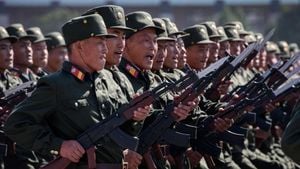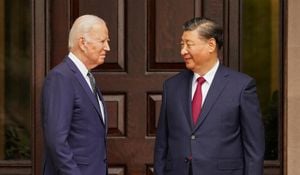The Tirumala Tirupati Devasthanams (TTD), overseeing the sacred site of Tirumala, recently made headlines when newly-appointed chairman B.R. Naidu announced his ambitious plans to create what he terms as 'Hindu-only' staff policies. This move aims to align the staffing at TTD, which manages rituals and operations at the revered Temple of Lord Venkateswara, with what Naidu believes to be the temple's core religious principles.
Naidu's statements sparked considerable discussion and concern, as he emphasized his intention to replace non-Hindu employees with only those who share Hindu beliefs. During his announcement, he revealed plans to potentially relocate non-Hindu staff members to other government departments or propose voluntary retirement options as methods of achieving this goal. "While every employee adds value, I believe it is important for our staff to resonate with the beliefs and practices of our temple," Naidu stated.
This announcement raises eyebrows not only because of its religious orientation but also due to its broader social and ethical implications. Critics argue this policy might marginalize individuals from different faiths who have been serving at the temple for years. Social rights advocates warn this could set new precedents for discrimination based on religion, which contravenes the secular principles enshrined within the Indian Constitution.
Naidu's tenure as chairman of TTD follows the appointment by the Andhra Pradesh government, which aims for significant changes within the temple administration amid increasing demands for adherence to traditional Hindu practices. Under his leadership, TTD plans to revitalize its focus on Hindu rituals and values, which according to him are pivotal for the temple's sanctity and integrity. This philosophy echoes the sentiments within certain political circles, particularly those advocating for the promotion of Hindu-centric governance.
Past administrations of TTD have pursued diverse staffing practices, one of which included hiring employees from various religious backgrounds, reflecting India's pluralistic society. Naidu’s proposals seek to revert from this inclusive approach, raising pressing questions about how this will affect the operational dynamics at one of the world's richest temples, which sees millions of pilgrims annually.
The viewers and stakeholders of TTD, which is not just seen as a religious institution but also as a cultural bastion, have voiced concerns over Naidu’s agenda. Various community leaders have urged him to reconsider such divisive measures, advocating for unity and cooperation over strict religious delineations. An individual with close ties to TTD remarked, "It is important to view staff as custodians of faith, rather than just through the lens of their religious affiliations. Spirituality does not belong to just one religion."
This situation becomes even more complicated as it intertwines with broader socio-political currents within India, where discussions around religious identity and secularism remain contentious. Political analysts suggest the push for Hindu-only staff aligns with the prevailing discourse among certain groups who seek to establish Hinduism’s primacy across various national institutions.
Responses to Naidu's direction have varied widely. Supporters of his initiative believe it is necessary to uphold the religious sanctity of Tirumala and maintain alignment with Hindu doctrines. They argue this is not just personnel management but rather part of larger efforts to protect cultural heritage and faith-based values.
Meanwhile, opposition groups including some secular organizations and political parties have mobilized against this policy, calling for adherence to constitutional principles. "A secular state must include all, respecting diversity rather than enforcing homogeneity. We must never forget the principles of freedom of belief and coexistence," one local leader stated vocally during protests.
The future efforts of TTD under Naidu will undoubtedly be closely monitored. Especially as the institution prepares to celebrate significant religious events, the impact of these policies could influence not only the day-to-day operations within the temple but also its global perception.
Moving forward, conversations surrounding staff inclusivity versus religious alignment seem poised to intensify. With the TTD as a focal point of this debate, it highlights broader conversations about how religious practices intersect with policy decisions, workforce management, and the sacred space shared by the millions who visit Tirumala.
Stakeholders await the next steps from TTD’s administration as the tug-of-war between tradition and modernity continues to unravel. Will TTD navigate these changes harmoniously or find itself at the epicenter of broader societal contention? Only time will tell as the story of faith and workforce integration continues to evolve within this historic space.



